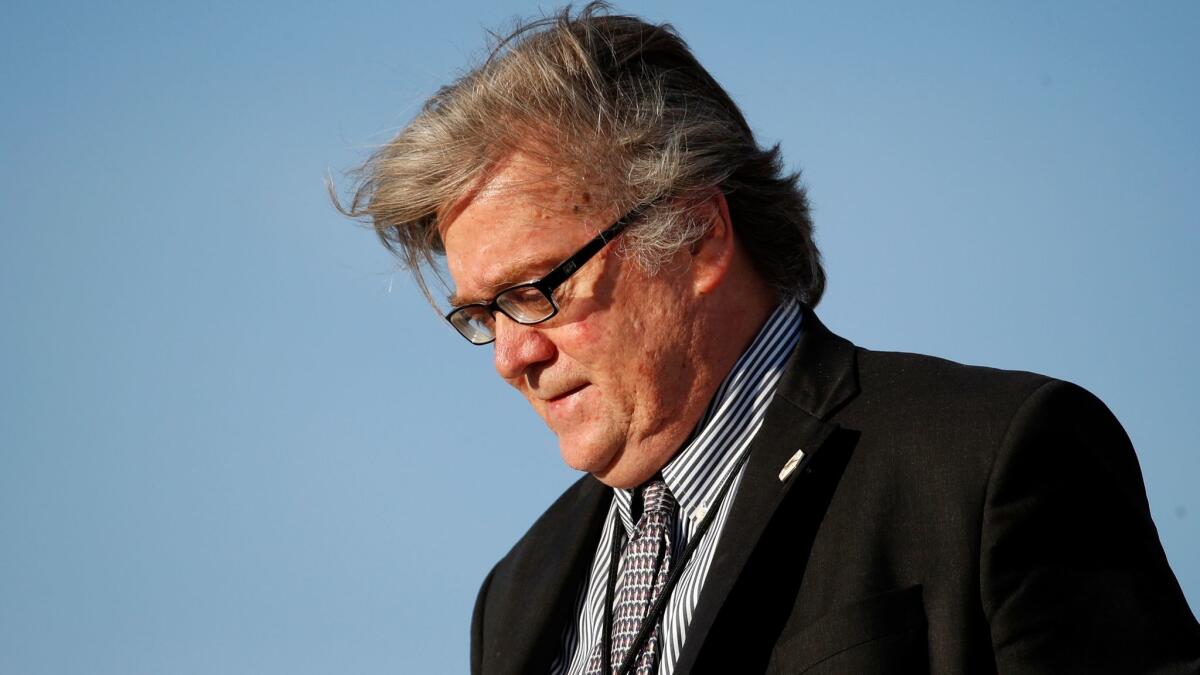Opinion: With Steve Bannon’s influence gutted, will moderates be able to drag Trump into the political mainstream?

- Share via
Stephen K. Bannon evidently likes to think of himself as the man who put Donald Trump in the White House. But his comments about Trump to journalist Michael Wolff have now put Bannon on the unemployment line.
Breitbart News announced Tuesday afternoon that Bannon had “stepped down” as executive chairman, the job he’d held since 2012 (although he took a leave of absence to join the Trump campaign in August 2016). The New York Times reported that Bannon’s departure wasn’t exactly voluntary; instead, he was rushed out the door by one of the site’s major funders, Rebekah Mercer, who had publicly washed her hands of Bannon last week.
The meteoric rise and fall of the investment banker turned media provocateur turned presidential advisor has the feel of one of those live-by-the-sword, die-by-the-sword romance epics, minus the epic and the romance. Bannon rose to prominence by helping to create a persona — the version of Trump who ran for the presidency and won — and a populist, anti-establishmentarian movement. But Bannon couldn’t tolerate the differences between Trump and the role Bannon had written for him. And worse, he couldn’t keep quiet about it. But then, that would have been a lot to expect from a guy who lives to shape the way the public perceives the world.
Alongside the billionaire financiers of the Mercer family, Bannon seized on candidate Trump as a merchant of chaos who could go to Washington and disrupt the entrenched forces who sustain big government. Bannon helped Trump, a politician more mutable than clay, focus on the discontents of working-class America and pass himself off as a populist in tailored suits.
Once Trump won the presidency, however, Bannon struggled to keep the White House and its deal-maker-in-chief faithful to the extremes of Trumpism. Ultimately, the champions of reason within the administration forced Bannon out after eight rocky months as Trump’s chief strategist. He returned to Breitbart, but couldn’t resist grabbing the spotlight on a regular basis with his critiques of the administration and its departures from the orthodoxy of the campaign.
And therein lies the problem. Unlike some movements, Trumpism really does revolve around one (mercurial) guy, Donald Trump. And Breitbart had become a house organ for the movement, which meant there was only so far Bannon could go in criticizing Trump without betraying the mission of the site that employed him.
Wolff’s book, “Fire and Fury: Inside the Trump White House,” was the last straw, even though it offered no new criticisms of the president’s temperament, intelligence or capabilities. The novel element was having the usual critiques come from people like Bannon deep inside the executive branch, close to the seat of power. And Bannon committed the ultimate sin in the eyes of the Trump faithful: He suggested that special counsel Robert S. Mueller III would actually find some attempt at collusion between the Trump campaign and Russian agents.
Talk about undermining your own work. Nothing would delegitimize Trumpism more than Mueller proving Russia had a hand in Trump’s victory.
Having lost Breitbart as an outlet for his views on how to make America great again, Bannon may lose whatever influence he had left over the movement he helped create. One can only hope that his rivals within the administration keep pushing Trump back toward the political mainstream, and that Trump’s transactional instincts lead him to strike deals with congressional Democrats instead of just playing to the base Bannon worked so hard to assemble.
Twitter: @jcahealey
More to Read
A cure for the common opinion
Get thought-provoking perspectives with our weekly newsletter.
You may occasionally receive promotional content from the Los Angeles Times.







